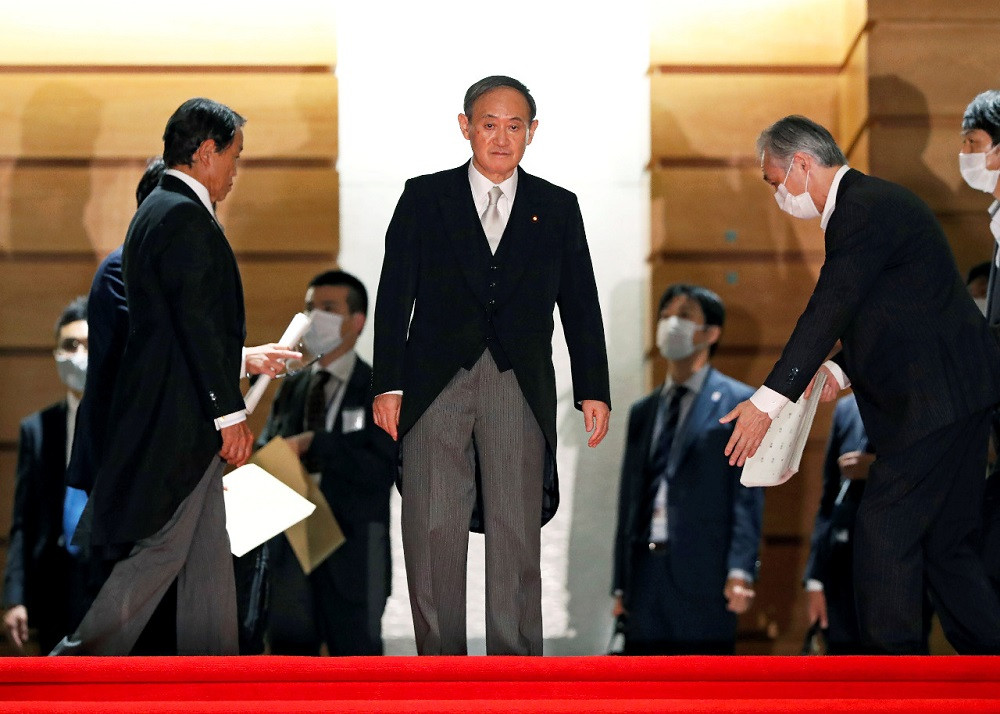The outlook of Indonesia-Japan relations under PM Suga
Japan needs to recalibrate its efforts in balancing the power competition of the US and China in the region, Indonesia included.
Change Size

J
apan has elected Yoshihide Suga the new prime minister, replacing Shinzo Abe who resigned amid a global pandemic. Suga’s appointment is the ruling Liberal Democratic Party’s way to ensure continuity of Abe’s major policies.
Suga himself has shown his keenness toward stability, vowing to maintain the ongoing Abenomics economic policy and coronavirus response during his campaign.
In his previous posts, Suga mainly demonstrated his influence over domestic policies. His rise to the premiership, albeit considered the safest choice in the current situation, has sparked concerns on the future of Japan’s foreign diplomacy.
When asked about his diplomatic trajectory, Suga promised to make “assertions at high-level talks” with China, while maintaining “solid ties with Asian nations by having the Japan-US alliance as the foundation”.
Throughout his career in the Abe administration, Suga made only two overseas trips, to Washington, DC, in 2019 to discuss issues related to North Korea and to Guam in 2015 to talk about the relocation of US troops from Okinawa.
Highlighting his involvement in “all of the important policy decisions” and presence during high-level Japan-US phone calls, Suga affirmed his goal to promote his own diplomatic footing, while at the same time acknowledging Abe’s foreign diplomacy feats and how he “cannot do the same” as his predecessor.
The Free and Open Indo-Pacific Strategy (FOIP) is undoubtedly one of Abe’s biggest flagship policies. A delicate balance between balancing China and hedging against the decline of Pax Americana, the FOIP has led to the intensification of Japan’s strategic relations with key countries such as India, Vietnam and Indonesia.
In economics, Indonesia has welcomed many Japanese companies onto its soil. During a meeting with President Joko “Jokowi” Widodo in 2018, Abe voiced his appreciation for Indonesia’s improving ease of doing business rating. Japan also participates actively in the Jokowi administration’s ambitious infrastructure development plans, with the Jakarta MRT project as a shining example.
When it comes to defense, both leaders agreed on the importance of maritime security and have established the Japan-Indonesia Maritime Forum to develop their cooperation. During the COVID-19 pandemic, Japan-Indonesia relations have stayed robust. Japan has delivered 12,200 Avigan tablets, a Japanese influenza drug allegedly effective for COVID-19 patients, as well as monetary aid through many international institutions.
Despite a change in leadership, Japan is expected to follow the same playbook. But, we have to keep in mind that this time around, the execution will be at the hands of a different coach. While LDP’s main impetus of pushing Suga toward premiership is to keep the status quo, some changes in Japan’s foreign policy focus should be expected.
After all, the Japan that Suga inherits from Abe is facing not only domestic pressure to heal the market, but also a regional push to resume leadership in times of escalated US-China tensions.
Japan needs to recalibrate its efforts in balancing the power competition of the US and China in the region, Indonesia included. The political and economic implications of rising tension between these two major powers pose a risk for the Indonesia-Japan bilateral relationship. Fortunately, Japan has always been deemed a trustworthy partner by President Jokowi’s government.
In relation to Indonesia, Suga was notable for receiving the Indonesian Minister of National Development Planning, Sofyan Djalil, during his visit to Tokyo to disclose the government’s decision to choose China over Japan for the Jakarta-Bandung high-speed train bid in 2015. Suga voiced Tokyo’s disappointment over the decision, saying Jakarta’s choice of Beijing was “extremely regrettable”.
However, there’s no doubt that Indonesia “uses” Japan to show its disagreement toward China. For instance, following China's undesired movements in the Natuna Sea early this year, Indonesia asked Japan to invest in the islands near the most disputed waters in the region, the South China Sea.
Recently, the Indonesian government also requested to add Japan to the consortium of the Jakarta-Bandung high-speed railway to develop the Jakarta-Surabaya semi-high-speed extension, the very same top-tier infrastructure project in which they initially chose China over Japan.
To curb the geo-economic impact of the COVID-19 pandemic, President Jokowi has also instructed the government to grab opportunities from Japanese corporate migrations out of China. Judging by Indonesia’s interests and the region’s current condition, this period is a golden time for Japan to win trust from the Indonesian side. Suga has to prove his ability to not only maintain what Abe has built, but also improve the relationship to its best potential.
Just like Japan, Indonesia has its reservations in associating too close with the two big powers. Indonesia’s key role in developing the ASEAN Outlook on the Indo-Pacific (AOIP) serves as a testament to Indonesia and Japan’s similar perspective of the region. Thus, in times where intensification of relations with the big powers are hindered, Indonesia and Japan should instead work together and strengthen the ties between them.
Key issues such as the migration of the production chain as well as cooperation in the maritime security front should be prioritized.
PM Suga’s early diplomatic moves will play a crucial role in determining where this relationship will go. While it is expected that he would initially look inward, he must not forget to reach outward and gain the trust of Japan’s strategic partners.
In times where tensions are heightened and multilateralism is being questioned, key regional players such as Japan and Indonesia have a duty to assume leadership and make sure this crisis does not lead to the downfall of contemporary regional architecture.
***
Noto Suoneto is a foreign policy researcher affiliated with the Foreign Policy Community of Indonesia (FPCI) Jakarta with research interest on East Asian affairs and the international political economy. Birgitta Riani, a graduate of Ritsumeikan Asia Pacific University, Japan, is a researcher at the FPCI with interest in the geopolitical dynamics of the East and Southeast Asia.









